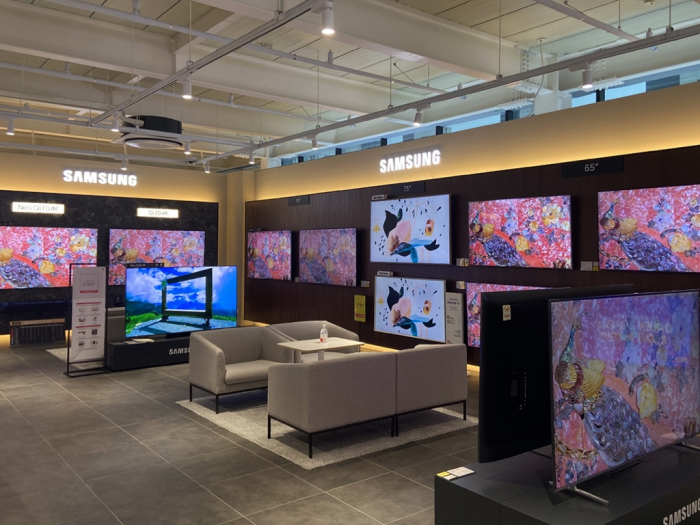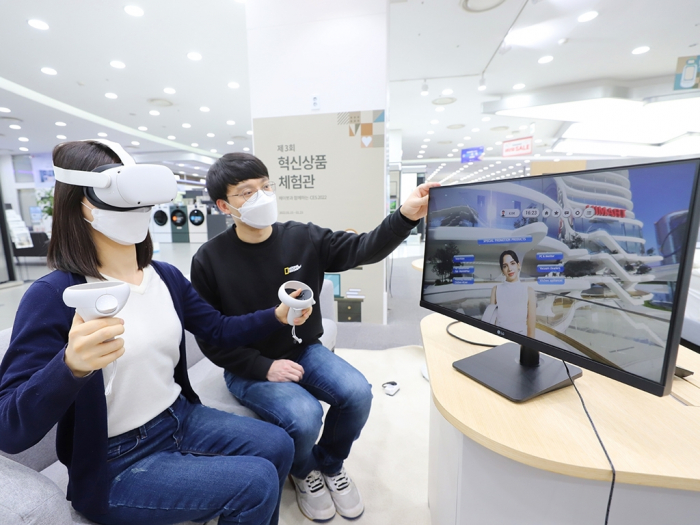Retail
Korea electronics retailers face headwind from e-commerce, dept. stores
Lotte Himart differentiates offline shops from dept. stores, launches used goods trading site; Electro Land expands online store
By May 18, 2022 (Gmt+09:00)
3
Min read
Most Read
When in S. Korea, it’s a ritual: Foreigners make stops at CU, GS25, 7-Eleven


Maybe Happy Ending: A robot love story that rewrote Broadway playbook


NPS yet to schedule external manager selection; PE firms’ fundraising woes deepen


Samsung steps up AR race with advanced microdisplay for smart glasses


Seoul appeal: Korean art captivates Indonesia’s affluent connoisseurs



South Korea’s major electronics retailers such as Lotte Himart are facing a headwind as more customers are buying home appliances online and department stores have ramped up their competitiveness on big-ticket items.
The electronics retail chain operators are struggling for survival, trying to bring back customers by selling fruits on their online stores and one even introducing a used goods trading platform.
GLOOMY EARNINGS
Lotte Himart, the local industry leader, reported an operating loss of 8.2 billion won ($6.5 million) in the first quarter, swinging from a 25.7 billion won profit a year earlier, according to its quarterly earnings statement.
Its sales declined 12% to 841.2 billion won on-year. The company plans to close 18 shops this year after shutting 21 stores last year.
Electro Land Co., the nation’s oldest electronics retailer, logged the first deficit in 2021 in nine years with an operating loss of 1.8 billion won, although its sales rose 3.3% to 878.4 billion won.
Such losses came as growing e-commerce in the electronics retail business has intensified competition, analysts said.
The domestic electronics retail market expanded 15.4% to 51.7 trillion won last year from 44.8 trillion won in 2019. The online sector’s market share rose to 61% from 45% during the two years, while the offline sector’s share fell to 39% from 55%.
The online sector’s growth accelerated as e-commerce players in other industries such as grocery delivery service Market Kurly and online fashion platform Musinsa started selling electronics.
Competition in the offline market also escalated on department stores’ aggressive moves to expand their presence amid customers' growing preference for higher-end models.
“Electronics retailers inevitably fell behind department stores in price competitiveness, given various promotions such as aggressive discount events,” said an industry source. “The retailers’ profitability is gradually deteriorating due to the intensifying price competition.”
Their earnings are unlikely to improve for a while as customers already completed purchases of home appliances during COVID-19 when they stayed more at home, analysts said. The industry is unlikely to see replacement demand as it usually takes longer for customers to replace such durable goods.
MEASURES FOR SURVIVAL
Electronics retailers are bending over backward in their struggle for survival.
Electro Land has been selling fruit on its online store in cooperation with fruit and vegetable wholesalers since last year to allure more customers. It has also starting selling other products such as cosmetics, healthcare goods, camping gear and even gold.
Lotte Himart sought to differentiate its outlets from department stores. It introduced new megastores and participation-oriented shops to provide customers with experiences that small shops in department stores cannot offer.

It introduced a brokerage service platform based on its offline stores for used goods trade last year to entice customers.
The Lotte Group’s unit is expected to speed up cooperation with the country’s largest furniture and home furnishing company Hanssem Co. this year, in which Lotte Shopping Co. bought a stake in 2021.
The investment was predicted to create synergy between Lotte Himart and Hanssem with joint marketing for customers that look for both electronics and furniture ahead of moving or getting married.
Write to Jong-Kwan Park at pjk@hankyung.com
Jongwoo Cheon edited this article.
More to Read
-
 Corporate restructuringHanssem to remodel itself into 'living tech' company
Corporate restructuringHanssem to remodel itself into 'living tech' companyApr 15, 2022 (Gmt+09:00)
3 Min read -
 Mergers & AcquisitionsLotte Shopping to acquire furniture maker Hanssem with IMM PE
Mergers & AcquisitionsLotte Shopping to acquire furniture maker Hanssem with IMM PESep 10, 2021 (Gmt+09:00)
1 Min read
Comment 0
LOG IN


